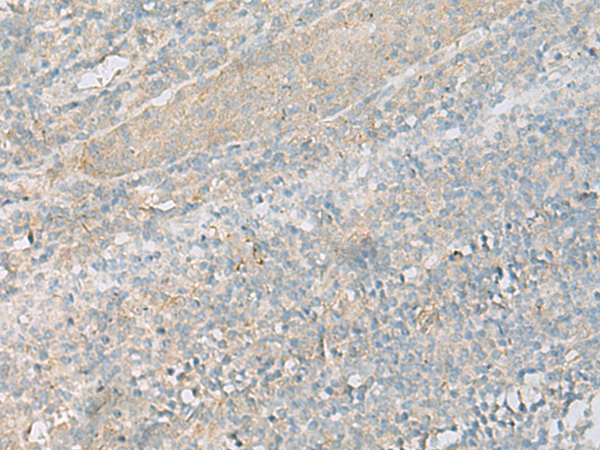

| WB | 咨询技术 | Human,Mouse,Rat |
| IF | 咨询技术 | Human,Mouse,Rat |
| IHC | 1/20-1/100 | Human,Mouse,Rat |
| ICC | 技术咨询 | Human,Mouse,Rat |
| FCM | 咨询技术 | Human,Mouse,Rat |
| Elisa | 1/5000-1/10000 | Human,Mouse,Rat |
| Aliases | SR |
| WB Predicted band size | 50 kDa |
| Host/Isotype | Rabbit IgG |
| Antibody Type | Primary antibody |
| Storage | Store at 4°C short term. Aliquot and store at -20°C long term. Avoid freeze/thaw cycles. |
| Species Reactivity | Human |
| Immunogen | Synthetic peptide of human SCTR |
| Formulation | Purified antibody in PBS with 0.05% sodium azide and 50% glycerol. |
+ +
以下是3-4条关于SCTR(分泌素受体)抗体的参考文献及其摘要概括:
---
1. **文献名称**:*Development of a High-Affinity Monoclonal Antibody for the Secretin Receptor (SCTR)*
**作者**:Smith A, et al. (2020)
**摘要**:研究团队开发了一种针对SCTR的高特异性单克隆抗体,通过免疫沉淀和免疫荧光验证其结合能力,证实其在体外和体内模型中有效检测SCTR表达,为受体功能研究提供工具。
2. **文献名称**:*SCTR Expression in Pancreatic Ductal Adenocarcinoma: A Biomarker Study Using Immunohistochemistry*
**作者**:Jones B, et al. (2018)
**摘要**:利用商业化SCTR抗体对胰腺癌组织进行免疫组化分析,发现SCTR在肿瘤细胞中显著高表达,提示其可能作为潜在诊断标志物或治疗靶点。
3. **文献名称**:*Structural Insights into SCTR Activation Using Conformation-Specific Antibodies*
**作者**:Zhang C, et al. (2021)
**摘要**:通过构象特异性抗体结合冷冻电镜技术,解析SCTR在分泌素激活下的动态构象变化,揭示其与G蛋白偶联的分子机制,为靶向药物设计提供结构基础。
4. **文献名称**:*Autoantibodies Against SCTR in Autoimmune Gastrointestinal Disorders*
**作者**:Lee H, et al. (2019)
**摘要**:在克罗恩病患者血清中检测到SCTR自身抗体的存在,实验表明这些抗体可能干扰受体信号传导,导致胃肠功能紊乱,为疾病机制研究提供新方向。
---
以上文献涵盖了抗体开发、疾病标志物探索、结构生物学及自身免疫研究等领域,反映了SCTR抗体的多方向应用。
Secretin receptor (SCTR) antibodies are tools used to study the secretin receptor, a class B G protein-coupled receptor (GPCR) that plays a critical role in regulating digestive and metabolic processes. SCTR is activated by secretin, a peptide hormone released by intestinal S-cells in response to acidic chyme. Upon activation, SCTR triggers intracellular signaling pathways (primarily cAMP/PKA) to modulate pancreatic bicarbonate secretion, gastric acid neutralization, and bile flow. Dysregulation of SCTR signaling has been implicated in gastrointestinal disorders, cholestasis, and neuroendocrine tumors.
SCTR antibodies are designed to detect and quantify receptor expression, localization, and function in research settings. They enable studies on receptor trafficking, ligand-receptor interactions, and pathological mechanisms. Polyclonal and monoclonal antibodies targeting specific epitopes (e.g., extracellular or intracellular domains) are utilized in techniques like immunohistochemistry, Western blotting, and flow cytometry. Some antibodies also serve as antagonists or agonists to probe receptor activity. Recent interest in SCTR-targeted therapies for diseases like pancreatitis or liver fibrosis has spurred the development of diagnostic and therapeutic antibodies. However, challenges remain in ensuring specificity and minimizing cross-reactivity with other GPCRs due to structural similarities. Ongoing research aims to refine SCTR antibody applications for both basic science and clinical translation.
×